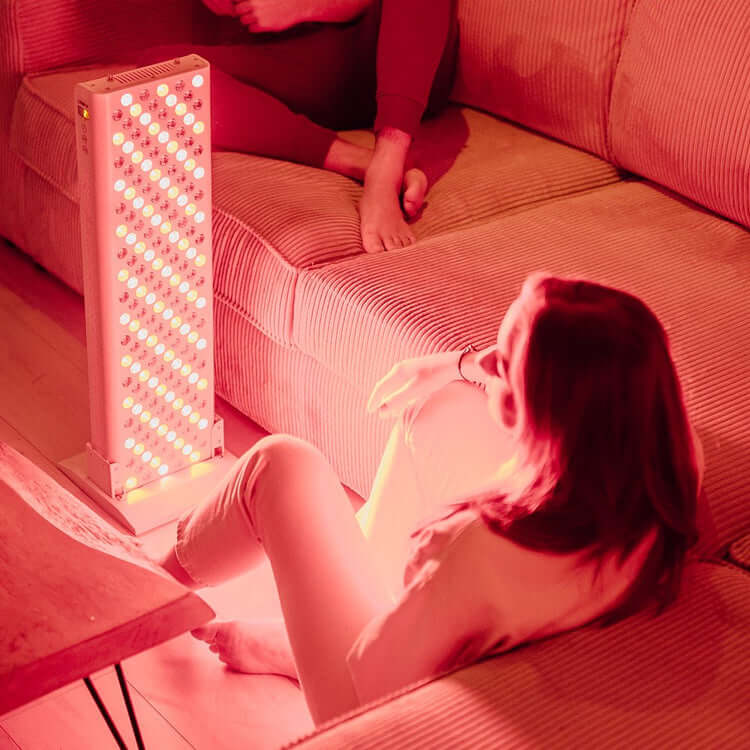How does infrared light therapy work?
Want to know more about the differences?
Summary | This is how light therapies work!

How does red light therapy work?
Red light therapy uses visible light in a specific wavelength range to stimulate your cells. It penetrates the outer layers of your skin and reaches the mitochondria , the energy factories of your cells. This increases the production of adenosine triphosphate (ATP) , your body's main energy source, which accelerates recovery and growth.
Red light feels comfortable, does not emit heat and is safe for skin and eyes when used correctly.
Reading tip: “ Red light lamps: Everything you need to know ”
Wavelengths
Red light is in a wavelength range of 600 to 700 nanometers . These wavelengths penetrate deep into the skin, up to several millimeters. This stimulates the mitochondria in your cells, the energy factories of your body. This increases the production of ATP, which supports cell repair and growth.

Applications & Benefits
Red light therapy has many applications and benefits:
- Reduced inflammation : Helps your body recover faster from injuries or irritations.
- Wound Healing : Promotes skin cell regeneration for faster healing.
- Skin Improvement : Stimulates collagen production for smooth, radiant skin .
- Pain Relief : Relieves muscle and joint pain, such as arthritis or muscle pain.
- Better sleep quality : Supports your natural sleep rhythm and reduces stress.
Using red light bulbs
Want to try red light therapy at home? Follow these guidelines:
- Duration : 10 to 20 minutes per session
- Distance : 15 to 30 centimeters from the skin
- Frequency : Start with 3 to 5 times per week (you can increase this later)

How does infrared light therapy work?
Infrared therapy uses light with longer wavelengths that penetrate deeper into your body. This light reaches muscles, joints and tissues, where it generates heat and activates recovery processes.
The deep heat relaxes muscles, stimulates blood circulation and accelerates healing. Infrared light relieves pain, reduces stiffness and swelling, and helps your body relax. It is therefore used in both therapeutic treatments and for general relaxation.
Reading tip: “ Infrared therapy: Everything you need to know! ”
Wavelengths
Infrared light is divided into 3 categories of radiation types: A, B and C (or IR-A, IR-B, IR-C). This classification is based on the wavelength of the infrared light :
- Short wave infrared (IR-A) : wavelength from 0.78 µm to 1.4 µm (1 µm = 1000 nanometers)
- Medium wave infrared (IR-B) : wavelength from 1.4 µm to 3 µm (1 µm = 1000 nanometers)
- Long wave infrared (IR-C) : wavelength from 3 µm to 1,000 µm (1 µm = 1000 nanometers)

Applications & Benefits
Infrared therapy offers profound health benefits. Think of:
- Deep Pain Relief : Reduces muscle stiffness and joint pain through deep heat.
- Faster recovery : Accelerates muscle and tissue recovery after exercise or injury.
- Improved blood circulation : Supports better oxygen supply and cell repair.
- Chronic conditions : Helps with conditions such as arthritis and fibromyalgia .
- Stress Reduction : Relaxes your muscles and calms your mind for more balance.
Instructions for use
Want to try infrared light therapy at home? Follow these guidelines:
- Duration : 10-15 minutes per body part
- Distance : 50 - 100 cm from the body
- Frequency : 3-4 times per week

Want to know more about the differences?
Red light therapy and infrared therapy are often mentioned in the same breath, but as you can read above, they are different treatments. For a clear overview of the most important differences, we have written an extensive blog, which you can read here: “ Infrared or red light: What is the difference? ”
Summary | This is how light therapies work!
Red light therapy uses visible light to penetrate your skin to give your cells a boost. It helps reduce inflammation, promotes healing and leaves your skin glowing.
Infrared therapy goes even deeper. Thanks to the longer wavelengths, it relaxes your muscles, improves your blood circulation and relieves pain. Ideal after a long day!
Both therapies offer great benefits , each in their own way. Choose what suits you best and experience the power of light yourself!






















